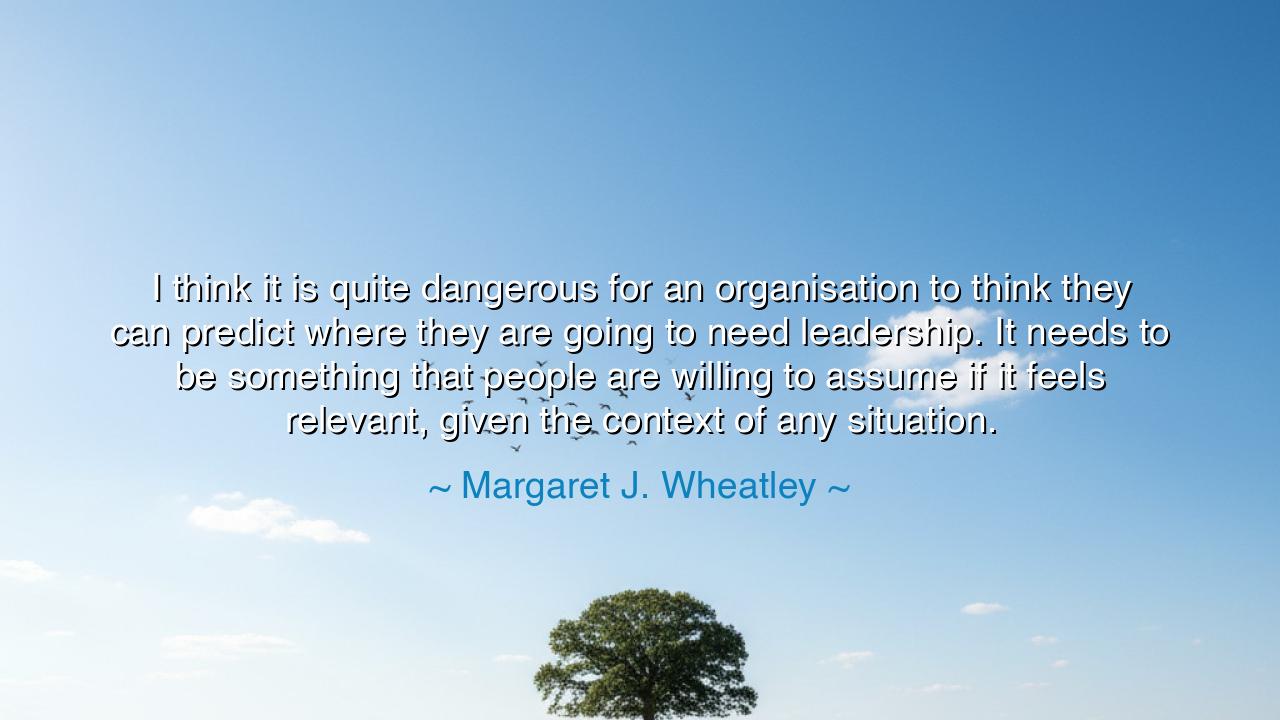
I think it is quite dangerous for an organisation to think they
I think it is quite dangerous for an organisation to think they can predict where they are going to need leadership. It needs to be something that people are willing to assume if it feels relevant, given the context of any situation.






The words of Margaret J. Wheatley — “I think it is quite dangerous for an organisation to think they can predict where they are going to need leadership. It needs to be something that people are willing to assume if it feels relevant, given the context of any situation” — are both a warning and a revelation. They remind us that leadership is not a fixed throne to be assigned, but a living spirit that must arise naturally when the moment demands it. To predict where leadership will be needed is to presume that the future will obey our plans; but life, as Wheatley teaches, is never so obedient. Her words speak of a deeper, more organic truth — that true leadership emerges from the soil of necessity, from individuals who feel called by purpose, not positioned by rank.
In the style of the ancients, we might say that the great river of time flows in unpredictable currents. The wise sailor does not command the river; he reads its signs and moves with it. So too with organizations, communities, and nations — those who seek to control leadership through charts and hierarchies often find themselves stranded when the unexpected storm arrives. Wheatley, a visionary thinker of systems and human dynamics, warns that rigid structures cannot nurture living leadership. It must be fluid, responsive, and shared, springing forth wherever courage meets necessity.
The origin of this quote lies in Wheatley’s lifelong study of how organizations behave as living systems. She observed that traditional management models — built on control, prediction, and command — fail in the face of complexity. In her seminal works such as Leadership and the New Science, she drew upon biology, physics, and ecology to reveal a truth long known to nature: that adaptability, not authority, sustains life. Just as ecosystems thrive through self-organization, human communities thrive when individuals rise to lead in the moment, driven by understanding rather than appointment.
History itself affirms her wisdom. When Ernest Shackleton and his crew were stranded in the frozen wastes of Antarctica in 1915, no plan could have predicted the trials they would endure. Leadership could not be designated in advance; it emerged through context — through moments of danger, despair, and decision. Shackleton led not because he was appointed captain, but because he remained responsive, compassionate, and decisive. At times, others too took initiative — men who stepped forward to solve problems, guide the sled dogs, or keep hope alive. Together, they survived because leadership flowed among them like a torch passed hand to hand. This, as Wheatley would say, is contextual leadership — alive, flexible, and grounded in relevance.
The danger, as Wheatley warns, lies in believing we can map the unpredictable terrain of the future. Many institutions still cling to the illusion of control — of grooming leaders for roles that may never matter, while ignoring the quiet wisdom rising from unexpected places. But the storms of change — economic, cultural, and spiritual — demand a new understanding: that leadership is not a position, but a participation. It belongs to anyone who recognizes what the moment requires and acts with integrity to meet it.
Wheatley’s teaching also carries a moral truth. To wait for someone else to lead is to deny our own responsibility. Leadership does not always come with titles or authority; sometimes it begins with a single person speaking truth, protecting others, or offering clarity in confusion. When a nurse comforts the fearful, when a teacher inspires courage in a student, when a worker proposes a new way that uplifts the whole — in each of these acts, leadership awakens. Thus, the call to lead is not external; it is an inner stirring, a recognition that something must be done, and that you are the one to do it.
Let this be the lesson carried forward: do not wait to be chosen — choose yourself when the moment calls. Do not demand certainty before acting — act with faith that clarity will unfold through engagement. Leadership, as Wheatley teaches, is not about control but about contribution. The wise organization will nurture this spirit, encouraging every soul to rise when the time demands, for in such freedom lies its strength.
And so, the teaching endures: life cannot be predicted, only participated in. The true leader is not the one who holds the title, but the one who holds the moment. Let us then cultivate awareness, courage, and readiness — to lead when it is needed, to listen when it is not, and to trust that in the grand web of human endeavor, every act of responsible presence is an act of leadership. For where there is willingness and wisdom, leadership will always arise — as naturally as dawn after the longest night.






AAdministratorAdministrator
Welcome, honored guests. Please leave a comment, we will respond soon